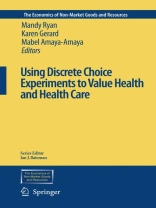USING DISCRETE CHOICE EXPERIMENTS TO VALUE HEALTH AND HEALTH CARE In recent years, there has been a growing interest in the development and application of discrete choice experiments (DCEs) within health economics. The use of this re- tively new instrument to value health and health care has now evolved to the point where a general text for practising professionals seems appropriate. The few existing books in this area are either research monographs or focus almost entirely on more advanced t- ics. By contrast, this book serves as a general reference for those applying the technique to health care for the first time as well as for more experienced practitioners. Thus, the book is relevant to postgraduate students and applied researchers who have an interest in the use of DCEs for valuing health and health care. Contributions are made by a number of leading experts in the field, enabling the book to contain a uniquely rich mix of research applications and methodological developments. Part 1 summarises how DCEs can be implemented, from experimental design to data analysis and the interpretation of results. In many ways, this can be regarded as a crash course on the conduct of DCEs. Extensive reference is made throughout to other sources of literature where the interested reader can find further details. Part 2 presents a series of case studies, illustrating the breadth of applications in health e- nomics.
表中的内容
Dces: What are they and their Application in Health A User’s Guide.- Discrete Choice Experiments in a Nutshell.- Designing Discrete Choice Experiments for Health Care.- Practical Issues in Conducting a Discrete Choice Experiment.- Case Studies in Valuing Health and Health Care.- Using Discrete Choice Experiments to Go Beyond Clinical Outcomes when Evaluating Clinical Practice.- Using Discrete Choice Modelling to Investigate Breast Screening Participation.- Preferences for Health Care Programmes: Results from a general population discrete choice survey.- Examining the Preferences of Health Care Providers: An application to hospital consultants.- Methodological Issues.- The Price Proxy in Discrete Choice Experiments: Issues of Relevance for Future Research.- “Irrational” Stated Preferences: A quantitative and qualitative investigation.- Using Stated Preference and Revealed Preference Data Fusion Modelling in Health Care.- Conclusions.- Concluding Thoughts.












